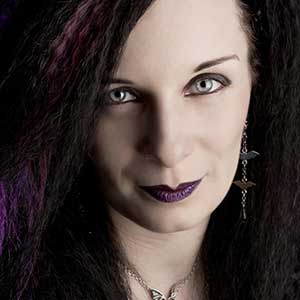10 years after Nightwish, Tarja Turunen is stronger than ever
Ex-Nightwish singer Tarja Turunen is proving her critics wrong with a pair of new solo albums

Select the newsletters you’d like to receive. Then, add your email to sign up.
You are now subscribed
Your newsletter sign-up was successful
Want to add more newsletters?

Every Friday
Louder
Louder’s weekly newsletter is jam-packed with the team’s personal highlights from the last seven days, including features, breaking news, reviews and tons of juicy exclusives from the world of alternative music.

Every Friday
Classic Rock
The Classic Rock newsletter is an essential read for the discerning rock fan. Every week we bring you the news, reviews and the very best features and interviews from our extensive archive. Written by rock fans for rock fans.

Every Friday
Metal Hammer
For the last four decades Metal Hammer has been the world’s greatest metal magazine. Created by metalheads for metalheads, ‘Hammer takes you behind the scenes, closer to the action, and nearer to the bands that you love the most.

Every Friday
Prog
The Prog newsletter brings you the very best of Prog Magazine and our website, every Friday. We'll deliver you the very latest news from the Prog universe, informative features and archive material from Prog’s impressive vault.
“The whole thing was such a shock, because it came out of nowhere – I never expected anything like that, and neither did my husband,” says Tarja Turunen, talking to us on the phone from Berlin. She is remembering the moment, a decade ago, when she was publicly sacked from symphonic metal giants Nightwish. “The Earth was shaking, everything was shaking, and we were both crying for two weeks.”
It’s 9am in Germany, and the Finnish singer is on the first day of the promotional campaign for her two new solo albums – The Shadow Self and its shorter ‘prequel’, The Brightest Void. She arrived in Europe yesterday evening after a 13-hour flight from the Caribbean, where she, her husband-manager Marcelo Cabuli and their three-year-old daughter Naomi are living. Life for the exiled frontwoman is a world away from what it once was, and she’s now the most in-demand female singer in her homeland.
“Being in Nightwish will always remain a big part of my life,” she reflects. “It was important, and it gave me a chance to be a solo artist and have a career on my own, since I never wrote any songs with the band.”

Born in a small village near Kitee in Finland, Tarja began learning piano at the age of six (taught by Nightwish founder Tuomas Holopainen’s mum), before studying music at the renowned Sibelius Academy, and joining Nightwish when she was just 19 years old. Her shock dismissal via letter nine years later pushed her into starting a solo career, successfully embracing both classical and metal arenas. She’s since performed all around the world, in prestigious locations like Finland’s Presidential Palace and with the Romanian National Opera. She was the winning judge for two seasons of Finland’s hugely popular version of The Voice, appearing alongside former Hanoi Rocks frontman Michael Monroe. And she recently became the first singer to be awarded her own emoji by the Finnish Ministry For Foreign Affairs, taking her place alongside icons such as former president and Nobel Peace Prize-winner Martti Ahtisaari and footballer Jari Litmanen.
In 2016, Tarja is a confident, über-glamorous soprano, who is hardly recognisable from the chubby-faced girl-next-door who sang on Nightwish’s debut, Angels Fall First. Bringing Nightwish up after all these years might seem superfluous, but without the platinum-selling band, she might never have achieved all the above. Although break-ups are often messy, Tarja remained composed and diplomatic throughout the media storm, despite the news even reaching Finnish Parliament, with the country’s then-Prime Minister Matti Vanhanen being asked for his opinion. She posted a heartfelt response online and kept her head down until the dark clouds had passed, and has barely spoken about the weeks and months that followed, or revealed what it was really like to go it alone after such a confidence-shattering shock.
When we ask her about that period in her life now, Tarja’s usually lively voice suddenly goes flat, and it’s clear her memories of the dismissal are still raw.
“I had to get away from Finland, so I took a flight [to Argentina, where her husband is from] the next day, and I was surrounded by the news even there. I was sitting on the plane, crying, and all the TV sets were being turned down. [It was on] the daily news: ‘Tarja is fired from Nightwish!’ It was following me every day for the next couple of weeks, and the TV cameras were outside my door in Buenos Aires. I couldn’t even get outside of my apartment. It wasn’t easy.”
Sign up below to get the latest from Metal Hammer, plus exclusive special offers, direct to your inbox!
Can she think of anything that might have triggered her dismissal?
“Well, um, the ‘anything’ was that nothing was fine within the band for many years,” she explains, choosing her words carefully. “The relationship between the musicians was all wrong for many, many years. That’s all I can say and all I want to say. Nightwish had already ceased to exist after their third album [2000’s Wishmaster].”
It’s a surprising thing to say, given the phenomenal success of 2002’s Century Child and 2004’s Once, as well as the albums that followed after her departure. But the period she refers to was one of huge internal upheaval, in which bassist Sami Vänskä was fired and replaced by the Viking-esque Marco Hietala. In 2003, Tarja lost her mother to cancer, and battled with her grief. That same year, she married her manager, Marcelo Cabuli, who Nightwish would later blame for their singer’s change in “attitude and behaviour” – an accusation that both have vigorously denied.
“It had to end the way it did so I can now be happier than ever, doing my own music for my own public,” she continues, philosophically. “It was tough to overcome, but the things that don’t kill you make you stronger I believe in that.”
Last year, Tuomas Holopainen told Metal Hammer that he thinks it’s “highly unlikely” he’ll speak to Tarja again, but the soprano hasn’t completely cut her ties with the Nightwish camp. In 2013, she performed a duet of the Gary Moore cover and Nightwish live favourite Over The Hills And Far Away with Floor Jansen at Belgium’s Metal Female Voices Festival. Although the Dutch singer is now a permanent member of the band, at the time she was just filling in as Nightwish’s touring vocalist, having joined after the dismissal of Tarja’s replacement, Anette Olzon. Tarja even introduced Floor as “my long-term friend”, quashing any suggestions of rivalry between them.

“I asked her to sing with me,” says Tarja, matter-of-factly. “I knew she was there [at the festival, with her then-band ReVamp] and we had a really great time. I’ve always kept in touch with Floor – in fact, we emailed each other just a few days ago.” Is she the only member of Nightwish you’re in contact with?
Tarja laughs. “I could say so, yes! Definitely the only member!” Friendly laughter punctuates the soprano’s conversation, but she can also be guarded in her replies. Although she admits to crying easily, she doesn’t come across as overemotional, which you might expect from someone who carries such passionate performances on stage. In fact, she seems tough and completely in control of her own destiny, even if she does occasionally quote mantras that sound like they’ve come from self-help books. It takes guts to not only carry on after you’ve been publicly humiliated, but to also to rise above criticism and face new challenges. Coincidentally, Tarja’s emoji sits next to the one for the Finnish word sisu, which roughly translates as ‘the feeling of perseverance’.
“I had to be positive. There was no other way,” she says earnestly. “Losing my mother was a really hard situation for me to live through. I’m still very emotional when I talk about her. I was very close to her, and she was one of the best people in the world. But life is tough, and you have to make the best out of all the time you have here. Otherwise, you’re wasting your time.” This control extends to all areas of her life, and she confesses she’s a perfectionist at home. You certainly won’t find any photos of her falling drunk out of taxis at 4am with her eyeliner smudged across her face and her ballgown tucked into her knickers. She shuns rock’n’roll excesses, takes care of herself with a gluten-free diet and exercise, and even admits that she “loves” doing the housework, which she describes as being “like therapy”.
Where the singer can let go is during her heavier shows, and her performances have dramatically shaped the sound of female-fronted gothic and symphonic metal. She’s become a pioneer, just like the diverse artists she lists among her favourites, such as Peter Gabriel, Queen, In Flames and Alice In Chains. This variety extends to her choice of guests on The Shadow Self and The Brightest Void, which include Chad Smith (Red Hot Chili Peppers/Chickenfoot), Arch Enemy’s Alissa White-Gluz (see The Unholy Alliance, left) and her The Voice Of Finland co-judge, Michael Monroe. Tarja is a diva in the traditional sense of the word – one who’s as comfortable singing traditional Xmas carols and Shirley Bassey covers as she is performing full-on rock shows in custom-made, leatherlook gowns. She’s not afraid to embrace stuff that’s cheesy or uncool; scoring metal points isn’t something that’s ever crossed her mind.
“I love opposites,” she says, and you can almost hear her grinning down the phone. “Rock gives me the freedom and classical music keeps me critical. When I hit the rock stage, I don’t need to be perfect. I use the knowledge I have as a classical singer, but I forget about the technical side of it. I just rock out and have fun with my band. But when I play in front of a classical audience with an orchestra, I have to be perfect. I get nervous every single time.”
Ask the singer today whether she’s also a diva who also exhibits prima donna behaviour, making demands for blue Smarties or bunches of white lillies backstage, and she snorts with hysterical laughter. “Oh my God! No way!” Tarja might struggle with the odd bout of stage fright, but she now has a lease of life she never enjoyed with Nightwish. Nearly 11 years on from her dismissal, she’s doings things on her own terms, and says she doesn’t regret a thing.
“Everything is different nowadays. I have a career, I have my audience, and a life as an artist,” she says. “I can also be free – it’s unbelievable to be able to choose things, or choose how to do things, and with whom to work. That freedom is something I would never give away.”
TARJA’S PREQUEL ALBUM, THE BRIGHTEST VOID, IS OUT ON JUNE 3. ALBUM THE SHADOW SELF FOLLOWS ON AUGUST 5. BOTH ARE RELEASED VIA EARMUSIC
Tarja streams new video for Innocence

Contributing to Prog since the very first issue, writer and broadcaster Natasha Scharf was the magazine’s News Editor before she took up her current role of Deputy Editor, and has interviewed some of the best-known acts in the progressive music world from ELP, Yes and Marillion to Nightwish, Dream Theater and TesseracT. Starting young, she set up her first music fanzine in the late 80s and became a regular contributor to local newspapers and magazines over the next decade. The 00s would see her running the dark music magazine, Meltdown, as well as contributing to Metal Hammer, Classic Rock, Terrorizer and Artrocker. Author of music subculture books The Art Of Gothic and Worldwide Gothic, she’s since written album sleeve notes for Cherry Red, and also co-wrote Tarja Turunen’s memoirs, Singing In My Blood. Beyond the written word, Natasha has spent several decades as a club DJ, spinning tunes at aftershow parties for Metallica, Motörhead and Nine Inch Nails. She’s currently the only member of the Prog team to have appeared on the magazine’s cover.
